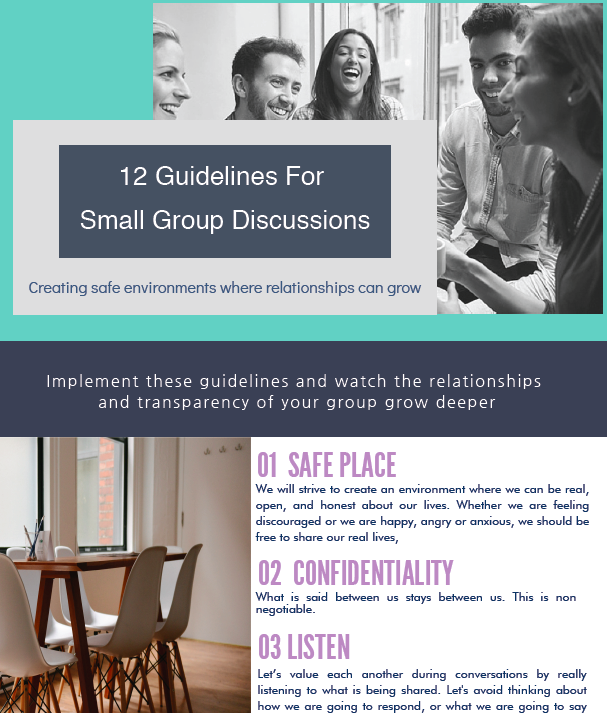(Be sure you scroll to the bottom to download your free pdf Guidelines CHART)
Do you find that you have a hard time getting people to connect in your small group system? Or are you a church launching small groups, and you’d like to set up for success?
Either way, getting people to connect and develop relationships with each other, outside of a weekend service is a great goal for a group to work towards.
These connections can do several things for your people.
1.) They give people accountability for weekend service attendance. They know someone will notice and care if they are gone.
2.) They strengthen ownership and unity in the church body, and generally increase participation in church activities.
3.) They provide opportunity for discipleship to take place.
Relational connectivity is a vital and key component of a small group. And it doesn’t happen by accident. The group leader must create an intentional relational environment. And a great way to begin is by setting some discussion guidelines for the group.
Having Small Group Guidelines…
- …gives boundaries for people to operate within.
- …helps with the flow and pace of the discussions.
- …helps us value one another.
- …helps people to be more comfortable sharing deep and meaningful things.
Here are the guidelines that every small group at Real Life Ministries puts into place. They are referenced each time the group meets, and are listed in the beginning of all the curriculum. They are meant to become the culture of the group to enable discussions that can be transparent and deep.
SAFE GROUP:
We will strive to create an environment where everyone can be real, open, and honest with their struggles and victories.
CONFIDENTIALITY:
What is said in the group stays in the group.
LISTEN:
Let’s value one another during the discussions by really listening to what is being shared. Try to avoid thinking about how you are going to respond, or what you are going to say next.
PAUSE:
Allow a pause in conversation after someone shares. Give the person sharing the chance to finish and the group the opportunity to consider what was just shared before responding.
SILENCE:
It is important to allow silence in the group as it provides an opportunity for someone to share and for members in the group to process the topic or question being considered.
NO “CROSS TALK”:
Be considerate of others as they are sharing. No side conversations.
NO FIXING:
We are not here to fix each other. Jesus does that part. Give encouragement; speak truth, and point to Jesus. Don’t try to solve or fix each other.
NO RESCUING:
When people are sharing something deeply personal, there can be a tendency to try to make them feel better about themselves or the situation by providing immediate condolences. This will often cause them to stop sharing. Resist the temptation to rescue people.
SHARING:
Be sensitive about the amount of time you share.
BE SELF-AWARE:
Be self-aware of how you are personally effecting the environment through your words, actions and non-verbal communication.
USE “I” STATEMENTS:
It’s easy to talk about the issues of others, but for our purposes, we want you to put yourself on the table. Try to use “I” statements rather than “them”, “the church”, “us”, “we”, etc.
CONFLICT:
We will commit to resolve conflict biblically. When conflict or sin issues between group members arise, we want to make sure that we are honoring God and each other in the way we deal with these issues.
The following are just a few key Scriptures in this regard (there are many others).
- If someone sins against you (Matthew 18:15-20)
- Restoring someone in sin (Galatians 6:1-5)
- Forgive a sinner (Colossians 3:12-13)
- Reconciling differences (Matthew 5:23-24, Matthew 7:1-5)
We challenge you to put these guidelines into place and see if the discussions go deeper! They are effective for all discussions, not just formal ‘small group’ settings.
If you would like a copy of these guidelines and definitions (In a pdf chart suitable for framing) to share with your church or group, or even to utilize in your own conversations, click below to access a free pdf download CHART– and you are welcome to use it as often as you want!
FREE! Guidelines For Small Group Discussion pdf
You may also be interested in these posts:
How To Facilitate A Discussion That Transforms Your Small Group On Three Levels








We are implementing these even in our Alpha course small groups – they’re amazingly effective! The only one we added was, “No sharing your spouse’s stuff”. Leave that up to the spouse. 🙂
Everytime i read your emails or posts, I receive such great encouragement, inspiration and wisdom. I pray that God will continue to give you His wisdom and empower you to keep sharing for His glory and the His kingdom. God bless.